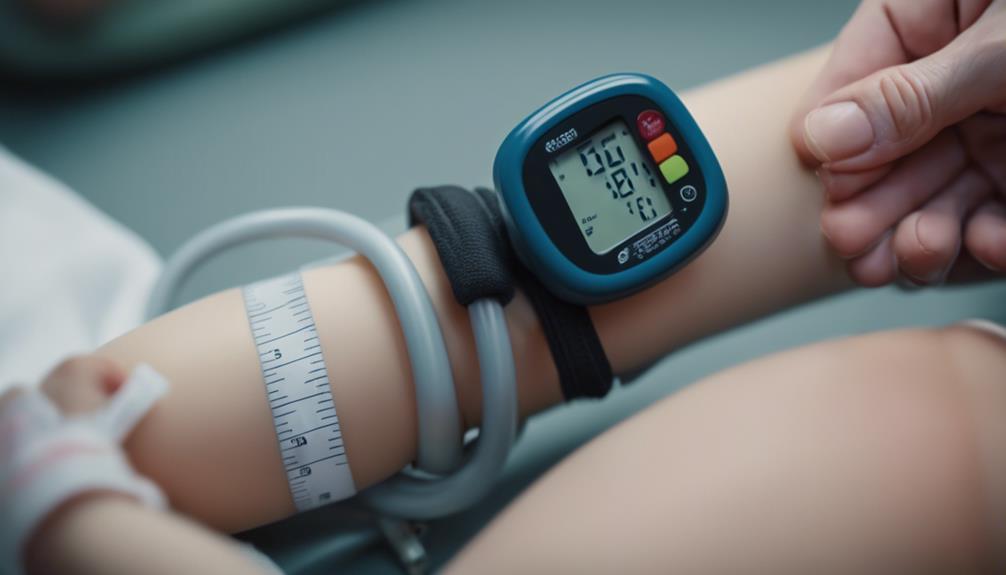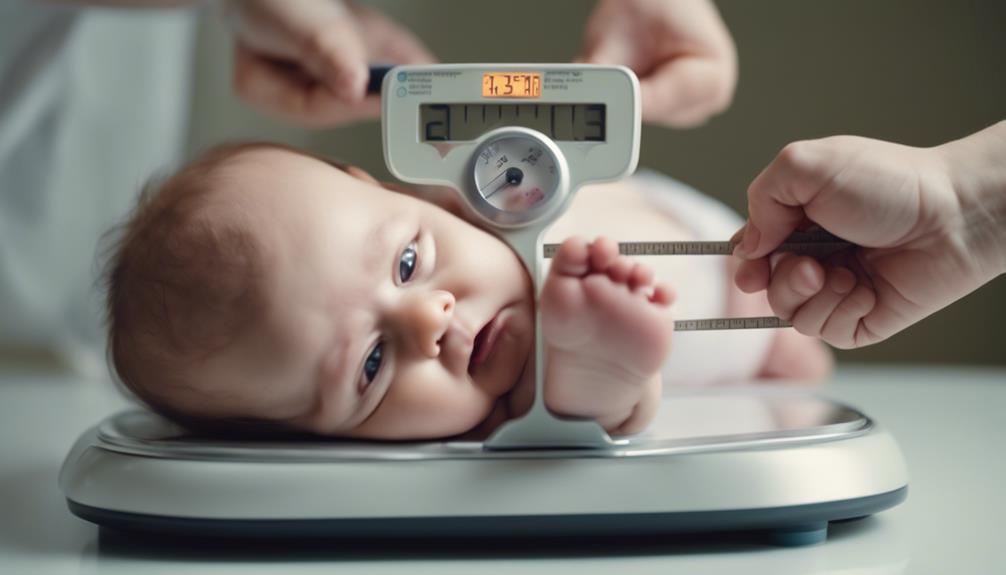To ensure your baby’s well-being, keep an eye out for these ten crucial indicators: body temperature should range from 97.4-99.6°F, utilize a digital thermometer; heart rate between 70-190 bpm; respiratory rate of 30-60 breaths per minute. Monitor blood pressure starting at age 3 for heart health. Observe skin color to ensure proper circulation. Aim for 6-8 wet diapers daily for adequate hydration. Check for clear or pale yellow urine. Make sure your baby urinates at least 6-8 times per day. Keep track of bowel movements. Initially, babies sleep for 14-17 hours per day; establish a bedtime routine for restful sleep. Learn about other essential signs for a healthy baby.
Key Takeaways
- Normal body temperature: 97.4-99.6°F.
- Heart rate: 70-190 beats per minute.
- Respiration rate: 30-60 breaths per minute.
- Skin color: Pink or rosy.
- Urination frequency: 6-8 wet diapers daily.
Body Temperature
To safeguard your baby's health, monitor their body temperature regularly using a digital thermometer for accurate readings.
A healthy baby's normal body temperature typically falls between 97.4-99.6°F (36.3-37.6°C).
Utilizing a digital thermometer guarantees precise temperature measurements in infants. It's vital to be aware that a fever in babies under 3 months old warrants immediate medical attention.
In babies, a rectal temperature of 99.6°F (37.6°C) is considered within the normal range.
Monitoring your baby's body temperature diligently aids in the early detection of potential health concerns, allowing for prompt intervention if needed.
By staying vigilant and regularly checking your baby's body temperature, you play an active role in safeguarding their well-being and ensuring they receive timely medical care if any abnormalities arise.
Heart Rate

Monitor your baby's heart rate as it serves as an important indicator of their cardiovascular health and overall well-being, complementing the assessment of body temperature. A healthy baby typically has a heart rate ranging from 70 to 190 beats per minute.
Factors such as age, activity level, and overall health can influence your baby's heart rate. Regularly checking and tracking their heart rate is essential in evaluating their cardiovascular health.
An unusually high or low heart rate in your baby could signal underlying medical conditions that require attention. By monitoring your baby's heart rate, you can detect potential health issues early on and make sure they receive the necessary care.
Respiration Rate
Monitoring your baby's respiration rate is essential for tracking their respiratory health and overall well-being. A normal respiration rate for a healthy baby typically falls between 30-60 breaths per minute.
It's worth mentioning that newborns usually have a faster respiration rate compared to older infants and children. By regularly observing your baby's breathing patterns, you can detect any potential respiratory issues early on.
Factors like crying, fever, or illness can temporarily impact your baby's respiration rate, so it's crucial to take these into account when monitoring.
If you notice any significant changes in your baby's respiration rate, such as persistent rapid breathing or difficulty breathing, it's important to seek prompt evaluation from a healthcare provider.
Keeping a close eye on your baby's respiration rate can help ensure that any potential respiratory problems are addressed promptly, promoting their overall health and well-being.
Blood Pressure

Observing your baby's blood pressure is essential to gauging the force of blood flow through their arteries, providing important insights into their cardiovascular health. High blood pressure in children can be a red flag for underlying heart or lung issues that require medical attention.
Pediatricians begin monitoring blood pressure in children from the age of 3 to catch any abnormalities early on. On the other hand, low blood pressure in children could signal problems like blood loss or severe infections, necessitating prompt intervention.
Understanding and keeping track of your baby's blood pressure is critical for detecting potential health issues and ensuring their proper growth and development. Regular monitoring allows healthcare providers to intervene if needed, maintaining your child's overall well-being.
Skin Color
Your baby's skin color can reveal important clues about their health. A pink or rosy hue typically indicates good circulation and oxygen levels.
Keep an eye out for any bluish or pale skin, as these colors may signal poor circulation and require medical attention.
Pale or Bluish?
Check your baby's skin color for signs of paleness or bluish discoloration, as these may indicate underlying health concerns. A healthy baby typically exhibits a rosy or pink skin color, reflecting good oxygenation and circulation.
However, if you notice your baby's skin turning bluish or pale, it could signal potential issues with oxygen levels, circulation, or respiratory health. These changes in skin color shouldn't be overlooked, as they can be key indicators of the baby's overall well-being.
Promptly consulting a healthcare provider is essential to address any abnormalities in skin color and guarantee your baby's health is properly evaluated. By monitoring your baby's skin color closely, you can gather essential information about their respiratory and circulatory health, enabling you to take timely action if needed to safeguard their vitality.
Pink and Warm?
With a healthy baby, you can expect to see pink and warm skin, indicating good blood circulation and proper body temperature regulation. Monitoring these signs is important as they reflect the baby's oxygenation levels and overall health. Here is a table to further illustrate the importance of pink and warm skin in newborns:
| Significance of Pink and Warm Skin in Babies |
|---|
| Indicates good blood circulation |
| Reflects proper oxygenation levels |
| Shows well-regulated body temperature |
| Can help detect health issues early |
| Helps maintain a healthy circulatory system |
Rashes or Discoloration?
When observing your baby's skin color, it's important to take note of any rashes or discoloration as they may indicate underlying health issues. Here are some key points to keep in mind:
- Normal skin color in a healthy baby is typically pink or pinkish-red, indicating good blood circulation.
- Rashes or skin discoloration in babies can be caused by various factors like diaper rash, eczema, or birthmarks.
- Yellowish skin (jaundice) may indicate liver or blood-related issues and should be evaluated by a healthcare provider.
- Bluish skin (cyanosis) can be a sign of poor oxygenation and may require immediate medical attention.
Monitoring your baby's skin color and any changes can help in detecting underlying health issues early.
Always consult a healthcare provider if you notice any concerning rashes or unusual skin discoloration on your baby.
Your vigilance in observing these signs can contribute to maintaining your baby's health and well-being.
Weight Gain

Monitoring your baby's weight gain is essential for evaluating their growth and development. Weight gain is a vital indicator of how well your newborn is thriving. Typically, babies double their birth weight by 5 months and triple it by their first birthday.
Initially, it's common for newborns to lose about 5-7% of their birth weight in the first few days, but they usually regain it by the time they reach 2 weeks old.
Breastfed babies may gain weight more slowly in the first few months compared to formula-fed babies, and this is normal. Regular weight checks are important to track your baby's health and progress over time.
If you have any concerns about your baby's weight gain or growth trajectory, it's always a good idea to consult with your healthcare provider. By staying informed about your baby's weight gain, you can make sure they're on the right track for a healthy development.
Feeding Patterns

Babies typically feed every 2-3 hours in the first few weeks of life to meet their nutritional needs consistently. Newborns have specific feeding patterns that help guarantee they receive the nourishment required for healthy development.
Here are some key points to keep in mind:
- Breastfed babies may nurse more frequently than formula-fed babies due to the quicker digestion of breast milk.
- Newborns show hunger cues like rooting, sucking on fists, or crying to indicate they're ready to feed.
- Babies should have 6-8 wet diapers a day, indicating they're getting enough milk during feedings.
- It's crucial to burp babies after feeding to prevent gas buildup and discomfort.
Understanding these feeding patterns and recognizing hunger cues in newborns can help you establish a feeding routine that meets your baby's needs. By responding to these cues promptly, you can make sure your little one stays well-fed and content.
Urination Frequency

A healthy baby's urination frequency is a key indicator of their hydration status. Typically, babies should urinate at least 6-8 times a day, demonstrating proper hydration levels.
Monitoring your baby's urine output can help you assess their overall health and guarantee they're well-hydrated.
Hydration and Urination
To guarantee your baby's health, pay attention to the frequency of wet diapers as it indicates proper hydration and kidney function. Adequate hydration is essential for your baby's well-being.
Here are some key points to take into account:
- A healthy baby should have at least 6-8 wet diapers a day, showing good hydration levels.
- Infrequent urination or dark-colored urine may signal dehydration and require immediate attention.
- Newborns may urinate as often as every 1-3 hours, gradually decreasing to 6-8 times a day by 4-6 months of age.
- Proper urination frequency is crucial for eliminating waste and maintaining fluid balance in your baby's body.
Keeping track of your baby's urination patterns can help you make sure they're adequately hydrated and healthy. If you notice any concerning changes in urination frequency or color, consult your healthcare provider promptly to address any potential issues.
Monitoring Urine Output
Keeping a close eye on your baby's urine output is essential for ensuring proper hydration and overall health. A healthy newborn typically urinates at least 6-8 times a day, with clear or pale yellow urine being a sign of adequate hydration.
By monitoring your baby's urine output, you can assess their hydration status effectively. Decreased urine output or dark-colored urine may indicate dehydration in infants. While newborns may have varying urine output patterns, consistency and frequency are key indicators of health.
If you notice any concerns regarding your baby's urine output, it's important to consult a healthcare provider promptly. This proactive approach can help address potential issues early on and make sure that your baby's health is being monitored effectively.
Bowel Movements

Experiencing variations in your baby's bowel movements during the early months is common as their digestive system continues to develop. It's important for babies to have different patterns, from multiple bowel movements a day to skipping a day or two without pooping but passing gas.
Remember, the first bowel movement, meconium, might surprise you with its content, which can include skin cells and hair from your little one. Keep an eye out for any signs of biliary atresia, a genetic condition affecting the bile ducts in newborns that can lead to potential liver damage.
Ensuring your baby's sucking reflex is strong is vital for their nutrition, whether they're breastfed or bottle-fed. Additionally, some newborns might benefit from nitric oxide therapy to improve oxygen levels in the blood, especially if they've specific respiratory conditions.
Sleep Patterns

During the first few months of life, babies typically sleep for 14-17 hours a day. Newborns often have erratic sleep patterns, sleeping in short spurts of 2-4 hours at a time before waking up for feeding or diaper changes.
As they grow, babies begin to establish more consistent sleeping habits, gradually sleeping for longer stretches at night. By 6 months, most infants can sleep for 6-8 hours at night without interruptions.
It's important to note that each baby is different, and sleep patterns can vary. To help babies develop healthy sleep habits, establishing a regular bedtime routine is key. This can include activities like bathing, reading a bedtime story, and dimming the lights to signal that it's time to sleep.
Understanding and adapting to your baby's sleep patterns can contribute to better rest for both the baby and the parents.
Frequently Asked Questions
What Are Normal Vital Signs for a Baby?
To understand normal essential signs for a baby, you should know that a typical heart rate ranges from 70-190 beats per minute. Breathing rates vary from 25-64 breaths per minute for 0-6 months and 22-61 breaths per minute for 6-12 months.
What Are Healthy Child Vitals?
You might think it's hard to keep track, but knowing healthy child vitals is crucial. Your baby's temperature, heart rate, breathing, and blood pressure are all essential signs to watch for their well-being.
What Are the 7 Vital Signs Normal Ranges?
You should know the normal ranges for essential signs in a healthy baby. Keep an eye on heart rate (70-190 bpm), respiratory rate (25-64 bpm for 0-6 months, 22-61 bpm for 6-12 months), temperature (97.4-99.6 F), and blood pressure.
What Are the 3 Most Important Vital Signs?
You're thinking about the most essential key signs? Well, let's delve in! Body temperature, heart rate, and respiratory rate are like the superstars of health checks for a baby. They're like the MVPs!
Conclusion
In summary, monitoring these 10 essential signs of a healthy baby is key for ensuring their well-being.
Did you know that a newborn baby's heart rate can range from 100 to 160 beats per minute?
By staying attentive to these signs, you can help keep your baby happy and healthy.
Keep an eye on these indicators and always consult with your pediatrician if you have any concerns.
Your baby's health is worth the extra attention.










